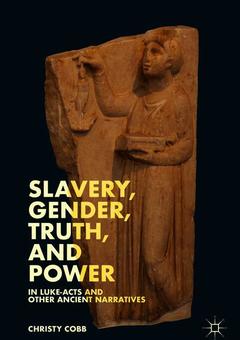Slavery, Gender, Truth, and Power in Luke-Acts and Other Ancient Narratives, 1st ed. 2019
Auteur : Cobb Christy

This book examines slavery and gender through a feminist reading of narratives including female slaves in the Gospel of Luke, the Acts of the Apostles, and early Christian texts. Through the literary theory of Mikhail Bakhtin, the voices of three enslaved female characters?the female slave who questions Peter in Luke 22, Rhoda in Acts 12, and the prophesying slave of Acts 16?are placed into dialogue with female slaves found in the Apocryphal Acts, ancient novels, classical texts, and images of enslaved women on funerary monuments. Although ancients typically distrusted the words of slaves, Christy Cobb argues that female slaves in Luke-Acts speak truth to power, even though their gender and status suggest that they cannot. In this Bakhtinian reading, female slaves become truth-tellers and their words confirm aspects of Lukan theology. This exegetical, theoretical, and interdisciplinary book is a substantial contribution to conversations about women and slaves in Luke-Acts and early Christian literature.
Chapter 1: Introduction: (Re)Turning to Truth
a. Dialogic Partners
i. Bakhtin and Narratology
ii. Slavery and Truth
iii. Feminism
b. Returning to Luke-Acts
c. Other Ancient Narratives
d. Dialogic Voices in Luke-Acts: Women and Slaves
i. Women in Luke
ii. Women in Acts
iii. Slaves/Slavery in Luke-Acts iv. Luke’s Three Slave-Girls
e. Outline for the Project
Chapter 2: Theoretical Foundations: Bakhtin and Narratology
a. Bakhtin and Biblical Narrativeb. Bakhtinian Genre: Menippea and Novels
c. Bakhtinian Perspectives within a Novel
i. The Role of the Author
ii. Outsidedness versus Insideness iii. Point of View or Focalization
d. Multivoicedness of the Novel: Polyphony and Dialogism e. A Topsy-Turvy World: Bakhtin’s Concept of Carnival
f. Intertextuality and Feminist Dialogics i. Intertextuality
ii. Feminist Dialogics
iii. Other Feminist Uses of Bakhtinian Theory
Chapter 3: The Slave-Girl Who Sees: Luke 22:47-62
a. Discipleship in Luke
b. Setting the Scene: Luke 22:47-62
c. “Now I am what I have come to be”: Callirhoe-as-Slave in Chariton’s Chaereas and
Callirhoe
d. Examining the Scene: The Role of the Slave-Girl in Luke 22:47-62 i. The Gaze of the Slave-Girl
ii. The Light of the Slave-Girliii. The Statement of the Slave-Girl
iv. Statements in Support of the Slave’s Truth
e. Conclusion: Truth is in the Eye of the Female Slave
Chapter 4: The Slave-Girl Who Answers: Acts 12:12-19
a. Acts 12: A Humorous Novella with a Purpose
b. A Rose by Any Other Name: Rhoda’s Role in Acts 12:12-19
c. Euclia, the Tortured Truth-Teller
d. Every Rose has Its Thorn: Rhoda in Scholarly Conversation
i. Rhoda Subverts Hierarchies ii. Rhoda Sustains Hierarchies
e. Conclusion: Rhoda’s Dialogic Purpose in Acts 12
Acts, rendering her role a necessary part of the narrative of Acts.
Chapter 5: The Girl Who Prophesies: Acts 16:17-18
a. Lydia and the Slave-Girl: Perspectives of an “Insider” and an “Outsider”
i. Lydia: “Inside the Pauline Circle
ii. The Outsider: A Prophesying, Truth-Telling Slave-Girl
b. The Slave-Girl’s Prophecy: The Truth about Paul and Silas c. Leucippe: A Free Elite Woman Treated as a Slave
d. Conclusion: The Prophesying Python
Conclusion: When Truth Equals Freedom
Focuses on characters that are often overlooked in biblical texts and scholarship: female slaves
Analyzes female slave characters using literary theory, feminist hermeneutics, and intertextual reading
Argues that Luke's female slaves are uniquely positioned to illuminate truth within the apostolic message
Date de parution : 05-2019
Ouvrage de 247 p.
14.8x21 cm
Disponible chez l'éditeur (délai d'approvisionnement : 15 jours).
Prix indicatif 94,94 €
Ajouter au panier

